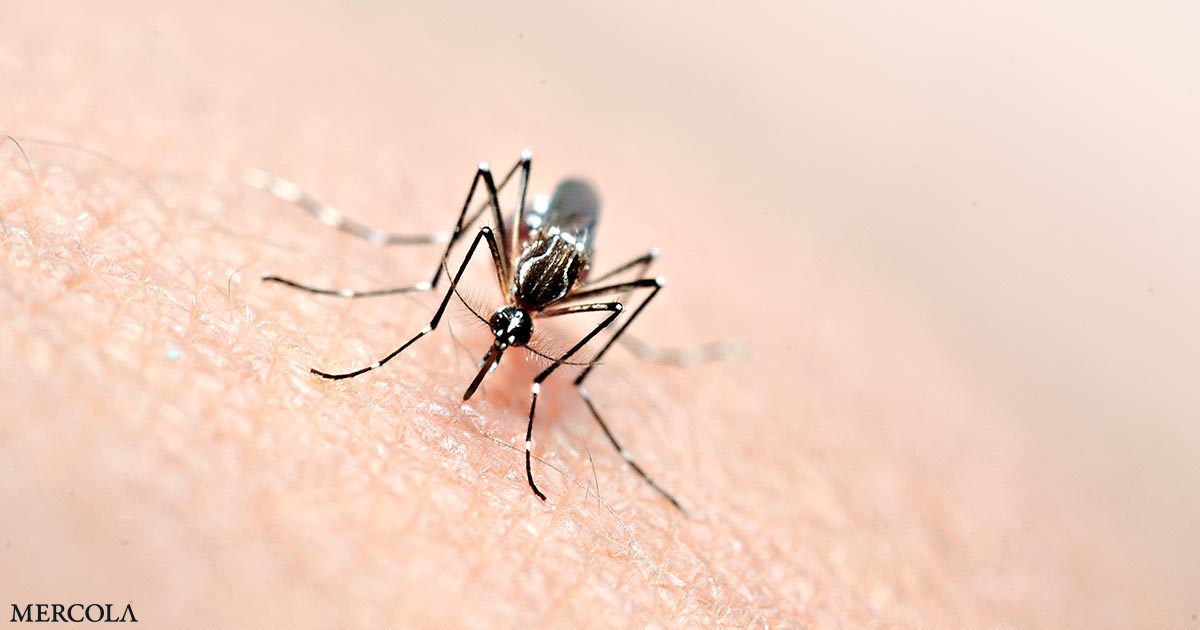Cases of dengue fever, also known as “break-bone” fever1 due to extreme joint pain being one of its hallmark symptoms, are soaring worldwide, with many countries reporting higher than usual numbers. While a majority of the cases are seen in tropical and subtropical areas like South Asia, Africa and South America,2 U.S. health officials have recently sounded the alarm about a rise of cases in several states.
In June 2024, the U.S. Centers for Disease Control and Prevention (CDC) issued an alert regarding the increasing dengue incidents in the Americas.
As of the latest epidemiological update from the Pan American Health Organization (PAHO),3 a record-breaking 9,852,482 suspected dengue cases were recorded from January to June 2024 — that’s twice as many as the reported cases (4.6 million) in 2023.4 “This represents an increase of 231% compared to the same period in 2023 and 420% compared to the average of the last five years,” PAHO reports.5
Two Florida Counties Record Increasing Dengue Cases
With its humid, subtropical weather all year round — the perfect breeding conditions for mosquitoes — Florida is one of the states being closely monitored for a potential dengue outbreak. According to the CDC, 197 dengue fever cases have been reported in the state. While the majority are travel-related (meaning infected locals have recently visited other areas where dengue is endemic), there are also reports of locally transmitted cases.6
One of the most recent locally acquired cases was in Hillsborough County, reported by the Florida Department of Health on June 24.7 Meanwhile, Miami-Dade County has reported six locally acquired cases this year.8 Although significantly lower than last year’s numbers — Miami-Dade had 173 locally acquired cases in 2023 — it’s still a cause for concern.
Other states like Hawaii, Texas, California and Arizona have also previously reported small local outbreaks of dengue fever9 according to the CDC, cautioning residents to be particularly vigilant.
“Dengue remains less common in the continental United States, but in the 50 states so far this year there have been three times more cases than at the same point last year. Most were infections that travelers got abroad, and officials note there is no evidence of a current outbreak. But they also warn that local mosquitoes pose a threat,” CBS News reports.10
Basic Facts About Dengue Fever
The dengue virus is a single positive-stranded RNA virus that belongs to the Flaviviridae family and is transmitted to humans by the Aedes mosquito species, particularly Aedes albopictus, Aedes polynesiensis and Aedes scutellaris.11 These small, black mosquitoes can be identified by the white stripes on their back and legs; the females lay their eggs in standing water. According to the Washington Post:12
“A single bottle cap filled with rainwater can hold more than 100 [mosquito] eggs, said Sadie Ryan, a medical geographer at the University of Florida who specializes in insect-borne diseases.
‘They’re tenacious, they’re pernicious,’ Ryan said. ‘Really, they’re just good at being everywhere.’ They behave like tiny vampires at a human buffet, flitting from person to person, potentially spreading disease with each bite.”
The Aedes mosquito can spread four types of dengue viruses, namely DENV-1, -2, -3 and -4, which are distinct but closely related. The CDC notes that about 1 in 4 people who become infected with the virus will get sick with dengue fever; the majority remain asymptomatic. When symptomatic, dengue fever could be either mild or severe.13
Dengue’s incubation period — from the time between exposure to when the symptoms start to manifest — is typically between four and seven days, although in some cases it can take as long as 14 days.14 Symptoms include:
|
A high fever around 104 degrees F or (40 degrees C) |
Severe headache |
|
Pain behind the eyes |
Joint and muscle pain |
|
Nausea and vomiting |
Swollen glands |
|
Rash |
Children with dengue fever may also experience common cold and gastroenteritis-like symptoms.15 In rare instances — about 1 in 20 patients — dengue fever can develop into a severe illness. Signs of severe dengue usually appear one to two days after the fever has subsided, and if not treated, may lead to shock, internal bleeding or even death.16
If you have been diagnosed with dengue fever and experience the symptoms below, it’s crucial to seek immediate treatment right away:17,18
|
Severe abdominal pain or tenderness |
Vomiting (at least three times in 24 hours) |
|
Bleeding from the nose or gums |
Feeling extremely tired or restless |
|
Vomiting blood or blood in the stool |
Rapid breathing |
|
Pale and cold skin |
Increased thirst |
Puerto Rico Has Declared a Dengue Epidemic
Although severe dengue fever may occur during primary infection, most instances occur during secondary infection — this is when you have been previously infected with one DENV strain and then re-infected with another strain. CBS explains:19
“When someone is first infected, their body builds antibodies against that type for life. If they get infected with another type of dengue, the antibodies from the first infection may fail to neutralize the second type —and actually can help the virus enter immune cells and replicate.”
This is a growing concern in Puerto Rico, which has been widely exposed to DENV-1 for the last two decades. According to Dr. Gabriela Paz-Bailey, the Puerto Rico-based chief of the CDC’s dengue branch, “We’re currently seeing increases in the cases due to dengue 2 and dengue 3, for which the population has very little immunity.”20
Puerto Rico declared a dengue epidemic in March 2024, with 549 cases reported and more than 340 hospitalized.21 Most of the cases were seen in the capital of San Juan. In May, the island reported its first dengue-caused death for the year.22 By June, the number soared to a whopping 1,498 cases,23 which is higher than the overall dengue cases (1,293) from all of 2023.24
But it isn’t just Puerto Rico and the Americas that are experiencing this surge. Worldwide, dengue cases have substantially increased in the last five years, according to the World Health Organization (WHO). Currently, 90 countries have known active transmission of this disease.25
There’s No Conventional Treatment for Dengue
Dengue fever is rarely fatal, but if you do fall ill because of this infection, it’s crucial to manage your symptoms and stay hydrated to help yourself recover. There is no known treatment for dengue; mild cases can be managed at home with pain medication and fluids. In severe cases, hospitalization may be necessary to ensure proper recovery.
The dengue virus messes with your bone marrow cells, which inhibits platelet production.26 This leads to thrombocytopenia, or a rapid decline in platelet count. As a result, platelet infusions are often advised with conventional treatment.
However, there’s growing research27,28,29 stating that transfusions to increase platelet count is questionable, and may cause further negative effects. One study, published in 2022 in the journal Case Reports in Hematology,30 notes:
“Thrombocytopenia is a very common clinical manifestation in dengue. The platelet count may drop very abruptly, but most of the time it follows its own clinical course and should be managed conservatively … It is very important for clinicians to know that platelet transfusions have no benefit in treating thrombocytopenia in dengue and should be avoided as they may cause significant side effects.”
Three years ago, New Delhi, India, experienced a dengue fever outbreak, which overwhelmed their local hospitals and led to a high demand in platelets. However, while patients manifesting severe symptoms like very low platelet count, internal bleeding or rashes may benefit from transfusions, the doctors were generally against preventive transfusions.31
In a Times of India article,32 Dr. Jyoti Kotwal, chairperson of the department of hematology at Sir Ganga Ram Hospital, commented:
“Transfusion runs the risk of transmitted infections. Platelet transfusion should not be overprescribed. In our hospital, we conduct immature platelet fraction tests before deciding whether a patient needs transfusion or not. It measures young platelet count instead of absolute count, which is a more reliable indicator of severity.”
Dr. Rommel Tickoo, director of internal medicine at Max Saket Hospital, echoed this sentiment, and said majority of patients can benefit from proper hydration and supportive therapy instead, as well as getting tested on time.
“We see patients who keep waiting at home with high fever for five to six days and rush to hospital with severe symptoms. … Get the dengue test done if fever and other symptoms persist for two days or more for timely diagnosis and treatment,” he advised.33
These Natural Remedies May Help With Dengue Recovery
While there are no medications that can cure dengue fever, you can turn to certain foods, herbal remedies and supplements to help naturally strengthen your immune system, increase platelet count and manage symptoms to help facilitate the healing process.
In one 2023 study,34 for example, scientists found that four types of carbohydrate-binding agents (CBAs) can help prevent the dengue virus from attaching to host cells, inhibiting the infection’s progress.
Amaryllis (Hippeastrum hybrid), Bovine lactoferrin (a protein found in cow’s milk), stinging nettle (Urtica dioica) and common snowdrop (Galanthus nivalis) were found to interfere with the virus’s ability to attach to healthy cells. This helps inhibit infection in the early stages:
“It was shown that the binding of HHA to the DENV-2 E protein blocked the interactions between DENV-2 and DC-SIGN, subsequently interfering with DENV-2 attachment to the host cells.
This indicated that these CBAs acted during an early stage of DENV infection by preventing viral attachment to DC-SIGN receptors on host cells,” the researchers noted.35
In addition, certain herbal remedies have antiviral properties that may help with dengue fever recovery. These include:
1. Carica papaya (Caricaceae) — A 2024 study published in the Asian Plant Research Journal36 says that leaf extracts of this exotic plant, native to Sri Lanka, can “neutralize plasma with the dengue virus, reduce platelet aggregation, and increase the production of the enzyme ALOX12, which promotes platelet production” in dengue patients.
An earlier study, published in the Sri Lankan Journal of Infectious Diseases in 2021,37 found that C. papaya extracts may help inhibit DENV-1 infections, suggesting “the potential of C. papaya leaf extract for future development of antiviral drugs against DENV-1.”
2. Euphorbia hirta (Euphorbiaceae) — Also known as “asthma plant,” this branched herb only grows up to 70 centimeters high but shows promising potential with its antiviral properties. One analysis published in 202238 notes that clinical investigations of E. hirta among dengue patients ages 30 to 35 years old found that supplementing with this herb helped reduce flu-like symptoms by approximately 70%. According to the study authors:39
“The in vitro analysis of the ethanolic extract of the plant showed remarkable inhibition of plaque formation up to 85% and 34.7% against DENV-1 and DENV-2, respectively.”
In the Philippines, where more dengue cases are being reported this year compared to 2023,40 a water decoction made with E. hirta leaves is used to help recover from this condition.41
3. Velvetleaf (Cissampelos pareira) — Native to Sri Lanka, India and the Amazon forest, velvetleaf is a flowering plant that belongs to the Menispermaceae family. A study42 highlights it as one of the botanicals that have shown promise in inhibiting DENV replication, noting that:
“Almost all parts … like aerial parts, roots, and stem barks as well as the whole plants show protective effects against DENV, which are not restricted to DENV-2 or DENV-1 only, but also against type 3 (DENV-3) and type 4 (DENV-4).”
4. Elderberry (Sambucus nigra L.) — Belonging to the family Adoxaceae, elderberry is rich in flavonoids, which are responsible for its antiviral activity. Aside from the extract, elder flowers and leaves were found to have antiviral effects against the DENV-2 strain, at concentrations of 400 micrograms/milliliter (ug/ml).43
5. Garlic (Allium sativum) — Garlic has been widely praised for its antibacterial, antioxidant, anticarcinogenic and other therapeutic properties. One study notes that the organosulfur compounds in this herb, particularly diallyl disulfide (DADS), diallyl sulfide (DAS) and alliin, may significantly inhibit the inflammatory cytokines in DENV-2 infection.44
Nutrition Matters — Boost Your Intake of These Nutrients
Getting enough rest, staying hydrated and consuming a healthy diet are all essential strategies if you’re recovering from a viral disease like dengue fever. During this time, it’s particularly important to get sufficient amounts of healthy nutrients, as some may particularly help speed up the healing process.
A 2021 literature review published in the American Journal of Tropical Medicine and Hygiene45 highlights studies from several countries on how supplementing with certain micronutrients may “offer hypothetical benefits to dengue patients via numerous potential mechanisms, including modulation of the host immune response.” Some of the nutrients mentioned include:
- Vitamin C — Indian researchers46 found that patients who were given supplemental vitamin C not only had a shorter hospital stay, but also had higher platelet counts than those who did not take the supplement.
- Vitamin D — A study from Pakistan47 divided dengue patients into two groups; only those in the first group received vitamin D supplements. The researchers found that those who did not receive the supplement were more likely to develop dengue hemorrhagic fever.
- Vitamin E — Researchers from Sri Lanka48 noted that dengue patients who received vitamin E supplements showed “improvements in various clinical and hematological parameters, including significantly higher subsequent platelet counts among patients admitted for thrombocytopenia.”
- Zinc — A study49 conducted in Thailand found that supplementing with zinc led to a shorter duration of hospitalization among children infected with dengue.
If you consume a healthy, well-balanced diet loaded with whole foods including fruits and vegetables, you’ll have no shortage of these nutrients. For example, kiwi, dragon fruit and papaya are rich in vitamins A, C, E and potassium, all of which may help promote immunity and increase your platelet count naturally.50 As for vitamin D, the best way to boost your levels is to get regular sun exposure as close to solar noon as possible.
Prevention Is Still the Best Course of Action
Summer is the best season to spend time in nature and under the sun, but the fear of being bitten by disease-ridden mosquitoes can make you hesitate. In order to keep you from becoming a mosquito magnet during this season, I recommend taking these preventive measures, so you can spend time outside without any worries:
|
Wear long sleeves and pants if you know you’ll be outdoors in a mosquito-prone area. |
|
Use natural insect repellants (not synthetic chemical versions), like cinnamon leaf oil, citronella essential oil or catnip oil, if necessary. |
|
Use a house fan in your backyard to keep mosquitoes away while you’re outdoors. |
|
Strategic planting of marigolds, which mosquitoes tend to stay away from. |
|
Drain standing water, including pet bowls, gutters, garbage and recycling bins, spare tires, bird baths and children’s toys, as this is where mosquitoes breed. |
|
Install a bat house, as mosquitoes are one of their favorite meals. |




